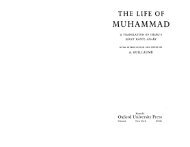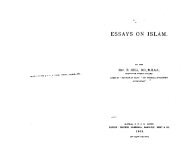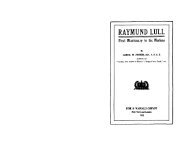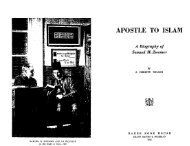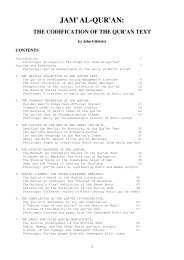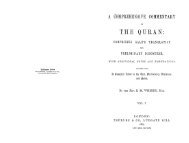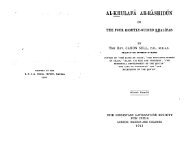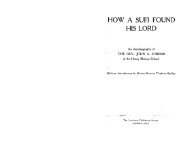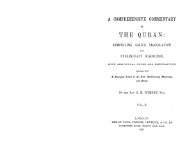Islam Its Belief and Practices - Radical Truth
Islam Its Belief and Practices - Radical Truth
Islam Its Belief and Practices - Radical Truth
You also want an ePaper? Increase the reach of your titles
YUMPU automatically turns print PDFs into web optimized ePapers that Google loves.
12 ISLAM ITS BELIEFS AND PRACTICES<br />
head is high in heaven opposite the<br />
Preserved Tablet, <strong>and</strong> his feet in the<br />
deepest regions under the earth; to a<br />
believer, however, he appears in a<br />
pleasing shape. See Qur'an 32: 11.<br />
6: 93.<br />
(b) Kiraman Katibln, the two illustrious writers.<br />
The two recording angels one on each<br />
shoulder of every person. Qur'an 82. 43: 80.<br />
(c) Munkar <strong>and</strong> Nakir: "The Unknown" <strong>and</strong><br />
"The Repudiating". The two angels who<br />
are said by MulJ,ammad to visit the dead<br />
in their graves <strong>and</strong> to interrogate them as to<br />
their belief in the prophet <strong>and</strong> his religion.<br />
(d) Malik: Lit. One in authority. The angel who<br />
is said to preside over hell, <strong>and</strong> superintend<br />
the torments of the damned. Qur'an 43: 77.<br />
(e) Zabaniyah: Lit. Guards. The angels in charge<br />
of hell, of whom Malik is said to be the cbief.<br />
Qur'an 96: 17, 18.<br />
Qur'an also mentions nineteen angels who are<br />
in charge of the punishment of the damned,<br />
see 74: 30, 31.<br />
(f) Rigwan: The name of the angel in charge of<br />
paradise.<br />
(g) Sijjil: The angel who has the charge of the<br />
register of the fate of mankind. Qur~an<br />
21: 104.<br />
(h) I;iamalatu'l-'Arsh: The Bearers of the Throne<br />
of God. They are said to be at present four,<br />
but will on the day of resurrection be<br />
strengthened by an additional four who will<br />
bear the Throne of God above them. Qur'an<br />
40: 7; 69: 17.<br />
FOUNDATIONS OF FAITH 13<br />
(i) I;iif~atun: Guardian angels: these angels continually<br />
attend men to guard them from<br />
dangers <strong>and</strong> such calamities, as are not<br />
decreed by God. Qur'an 6: 61; 86: 4.<br />
{j) Hariit <strong>and</strong> Mariit: Two angels who, in consequence<br />
of their complaints for the sin of<br />
mankind were sent down to earth to be<br />
tempted. They both sinned by falling in<br />
love with a woman. They were permitted to<br />
choose whether they would be punished now<br />
or hereafter, they preferred to be punished in<br />
this world <strong>and</strong> consequently are suspended<br />
by their feet in a rocky pit at Babel. Qur'an<br />
2:96.<br />
(2) Jinn: The belief in Jinn is based on the teaching of the<br />
Qur'an. They are especially mentioned in chapter<br />
72. They are peaceable by nature. They eat <strong>and</strong><br />
drink, <strong>and</strong> propagate their species, sometimes in<br />
conjunction with human beings; in which latter<br />
case, the off-spring partakes of the nature of both<br />
parents. In all these respects they differ from the<br />
angels. Some of the Jinns are said to be Muslims,<br />
<strong>and</strong> others infidels.<br />
The tradition says that God created Jinn of smokeless<br />
fire (Qur'an 15: 27) some two thous<strong>and</strong> years<br />
before Adam. They are said to appear to mankind<br />
most commonly in the shapes of serpents. dogs,<br />
cats, or human beings. In the last case they are<br />
sometimes of the stature of men, <strong>and</strong> sometimes of<br />
a size enormously gigantic. If good, they are generally<br />
resplendently h<strong>and</strong>some; if evil, horribly hideous.<br />
They become invisible at pleasure or suddenly<br />
disappear in the earth or air. or through a solid wall.



